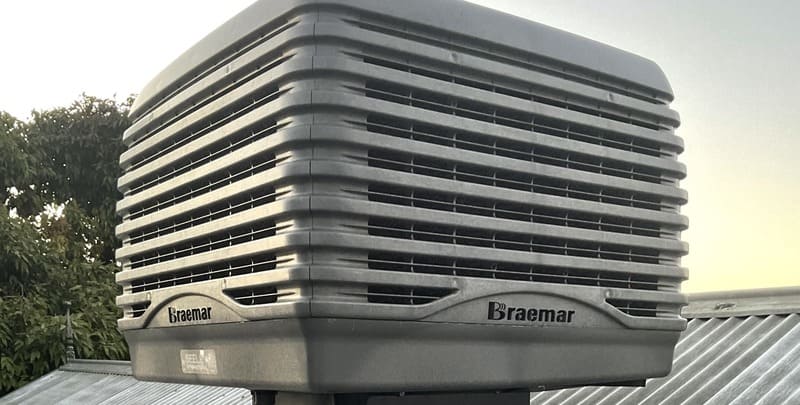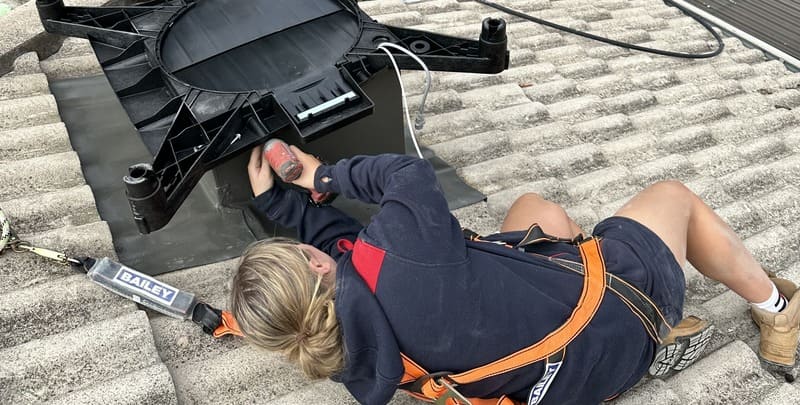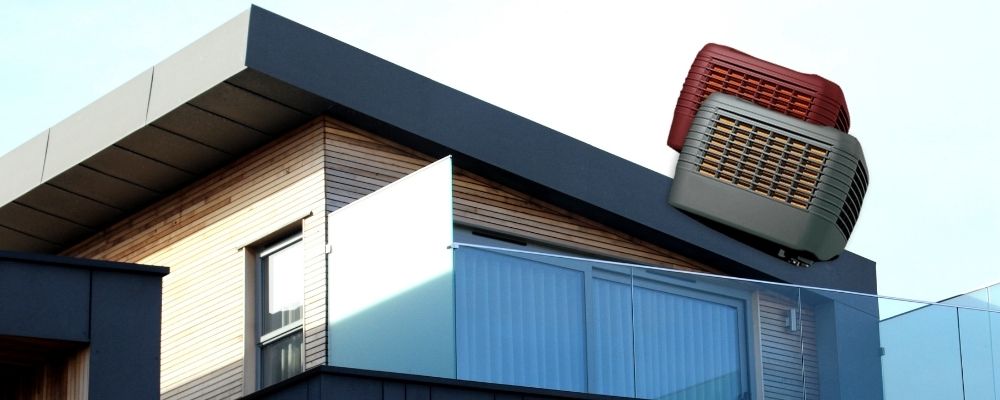Welcome to the world of air conditioning! It’s a place where dreams come true if your dream is comfortable climate control at home. And let’s face it, we all want that.
At some point in life you will have to pick out a new air conditioner. It’s a difficult decision, however, with different types, brands and features to choose from. As a big budget investment you also want to make the right choice.
Evaporative cooling might well be the perfect choice for you. It’s a fresh alternative to standard refrigerated cooling and countless Australians love it. Efficient, affordable and comfortable: an evaporative cooling system could be the newest addition to your house.
This is what you need to know about evaporative cooling systems.
How Does Evaporative Air Conditioning Work?
We’re not here to dig into the complete intricacies of evaporative cooling. If you want to know the basics of the evaporative cooling process, warm outside air is cooled by evaporation, with the chilled air transported throughout the home. Simple.
However, we’re also here to dig slightly deeper. The roof-mounted evaporative cooler contains a fan which draws in warm air. Obviously the air is hot and dry, so it needs to be cooled down. This occurs as the air passes through damp cooler pads that receive a constantly supply of water from an internal reservoir.
As a result of hot meeting cold, cool water molecules evaporate and the temperature inside the cooler drops considerably. The chilled air is then transported through ceiling ducts.
Compared to a traditional ducted air conditioner, fresh air is constantly pushed into the home, rather than recycled through return vents. Therefore, warm air is not cooled repeatedly. Rather it is cooled once and then replaced by freshly chilled air. There is also a higher level of moisture in the air for an additional burst of rejuvenation.

What are the Health Benefits?
One of the best things about evaporative cooling is that it maintains high indoor air quality. Stale air is not recycled, reducing the number of contaminants and allergens constantly churning through a home.
Despite our best efforts, we all slip up at times with air conditioning maintenance. For example, filters are not cleaned regularly. This leads to an inability to collect and filter out dust, pollen, fur or bacteria in the air. People with asthma or skin conditions like eczema will be among those most affected by these air quality imperfections. And that’s heightened by a constant recycling of low quality indoor air.
An evaporative cooler greatly reduces the risk of allergic reaction. Since fresh air is constantly brought into the home, it’s essentially already filtered. The damp cooling pads filter out natural imperfections, and anything that remains is soon circulated outside. It means no one has to sit around breathing stale air full of contaminants or allergens.
In addition to this, higher levels of moisture in the air also prevent skin and eye irritation. This maintains a complete feeling of freshness, much like a sea breeze. If you compare the difference between evaporative cooling and refrigerated cooling, you will notice a change in how your skin feels.
Are Evaporative Coolers Better for the Environment?
The short answer is: Yes. The use of evaporation as a cooling technology has two key benefits.
On one hand, an evaporative cooling air conditioner operates with reduced energy consumption when compared to other ducted air conditioners. Less electricity is required per hour, equating to lower running costs and greater environmental benefits.
Meanwhile, no harmful hydrochlorofluorocarbons (HCFCs) or chlorofluorocarbons (CFCs) are used. HCFCs are man-made refrigerant chemicals used in air conditioners and fridges. That’s another one of the great benefits of evaporative cooling. The negative impact on the ozone layer is well documented, with HCFCs currently disappearing from mainstream use.
CFCs have already been phased out, with refrigerants like H22 on the way out, too. Still, it’s a slow transition and reversing past damage is difficult. The opportunity to reduce your impact on the environment from day one is greatly improved with the use of evaporative air conditioning.

Can Evaporative Air Conditioning be Paired with Heating?
There’s one key word missing from evaporative cooling: heating. That’s because there is no evaporative heating – it only cools air. As a result, you need an alternative source of heat.
Thankfully, quality options are readily available, including gas log fires and gas ducted heating systems, to complement evaporative systems.
Leading manufacturers like Rinnai and Bonaire provide both evaporative coolers and gas ducted heating. It’s easy to purchase one with the other as an add-on. However, it’s not necessarily as straightforward as you might think.
The two systems use different duct systems and external motors. Therefore, you will have twice the amount of ducting in your ceiling space. Both units will also need the space for external installation.
Now, licensed installers can easily take care of this without any fuss. It’s more so that you have to be aware of additional upfront costs and space requirements.
Is Evaporative Cooling Suitable for all Locations?
If there’s one downside of evaporative air conditioning, it’s that it struggles with high humidity. That’s because it typically mimics natural humidity when it fans evaporated air throughout your house. And when that occurs in an already humid environment, moisture levels can become too high. The damp cooler pads will also be susceptible to mould growth.
Thankfully, most major Australian cities and regions are well-suited to evaporative air conditioning. Only the Australian climate regions in the northern parts of Australia will not suit evaporative cooling.
Otherwise, Australia is the perfect place for it. An evaporative cooling system will counteract the impact of dry summers easily. You’ll appreciate the continuous supply of cooled air from a ducted evaporative cooling system.
If you’re still a little unsure about whether it’s right for you, Air Con Service Near Me is ready to help. We provide on-site assessments to determine the best type of air conditioner for your home. Meanwhile, we also help with repairs and replacement services if you want to upgrade an existing evaporative cooler.
To learn more about evaporative coolers, contact us today.
Please note: This information is provided for advice purposes only. Regulations differ from state to state, so please consult your local authorities or an industry professional before proceeding with any work. See our Terms & Conditions here.

